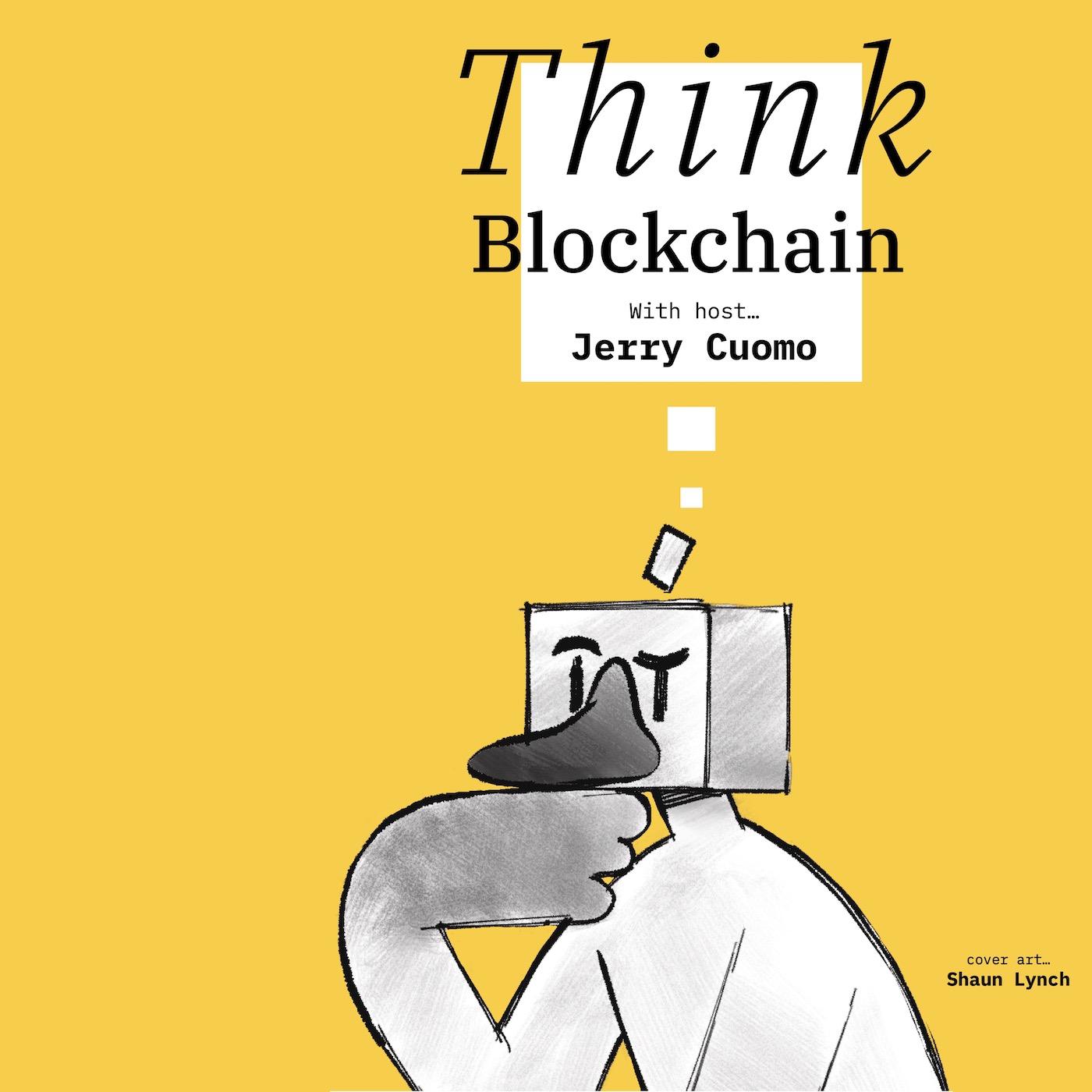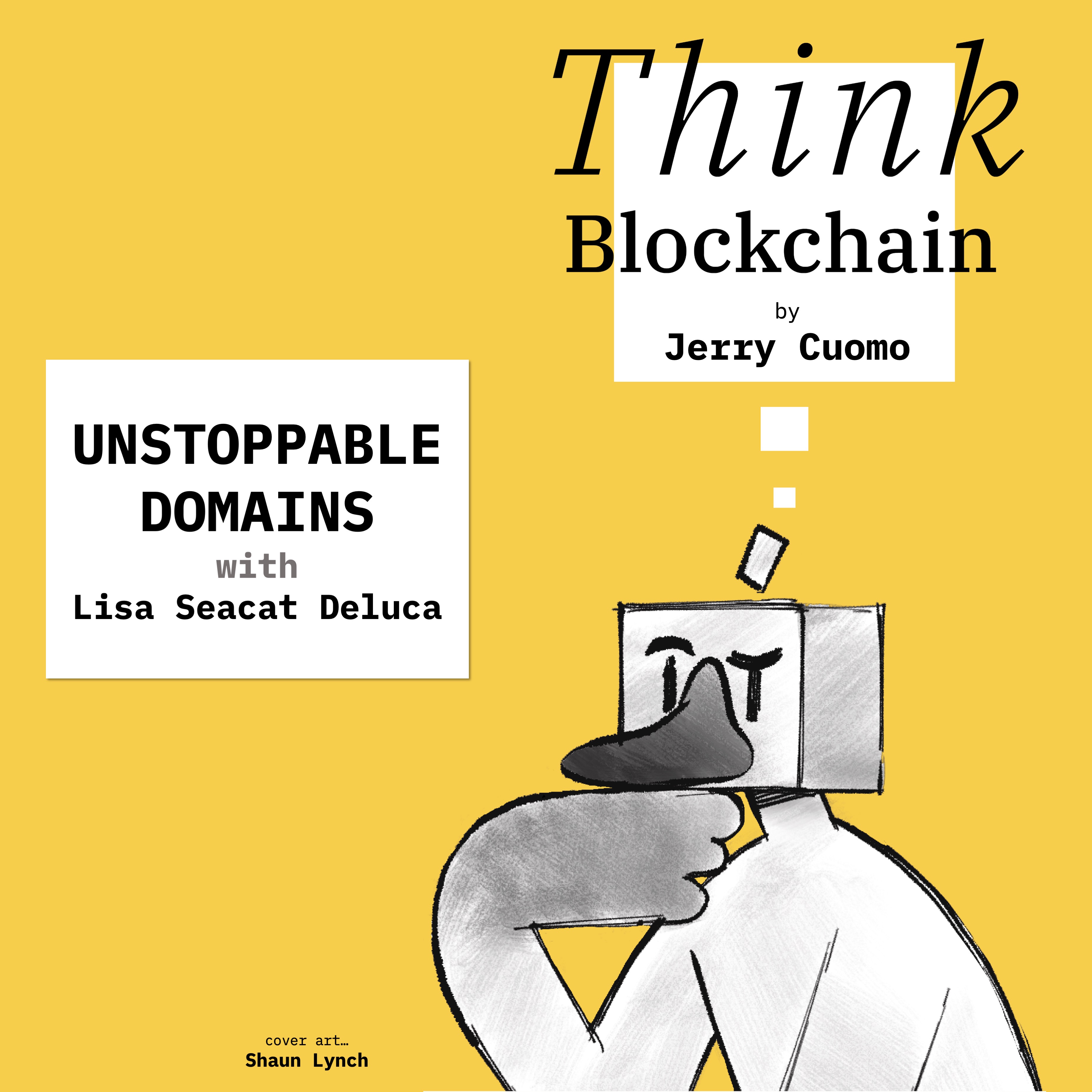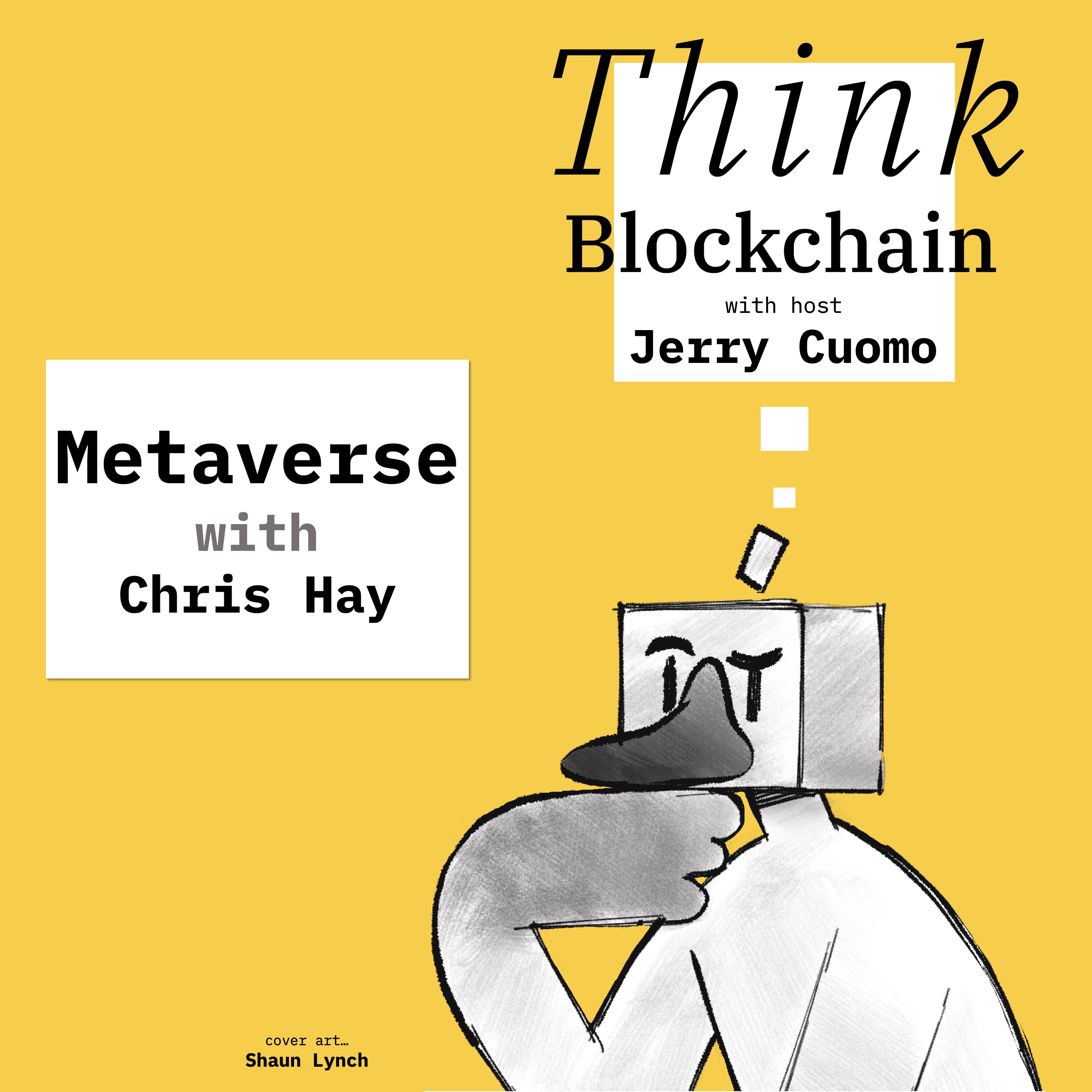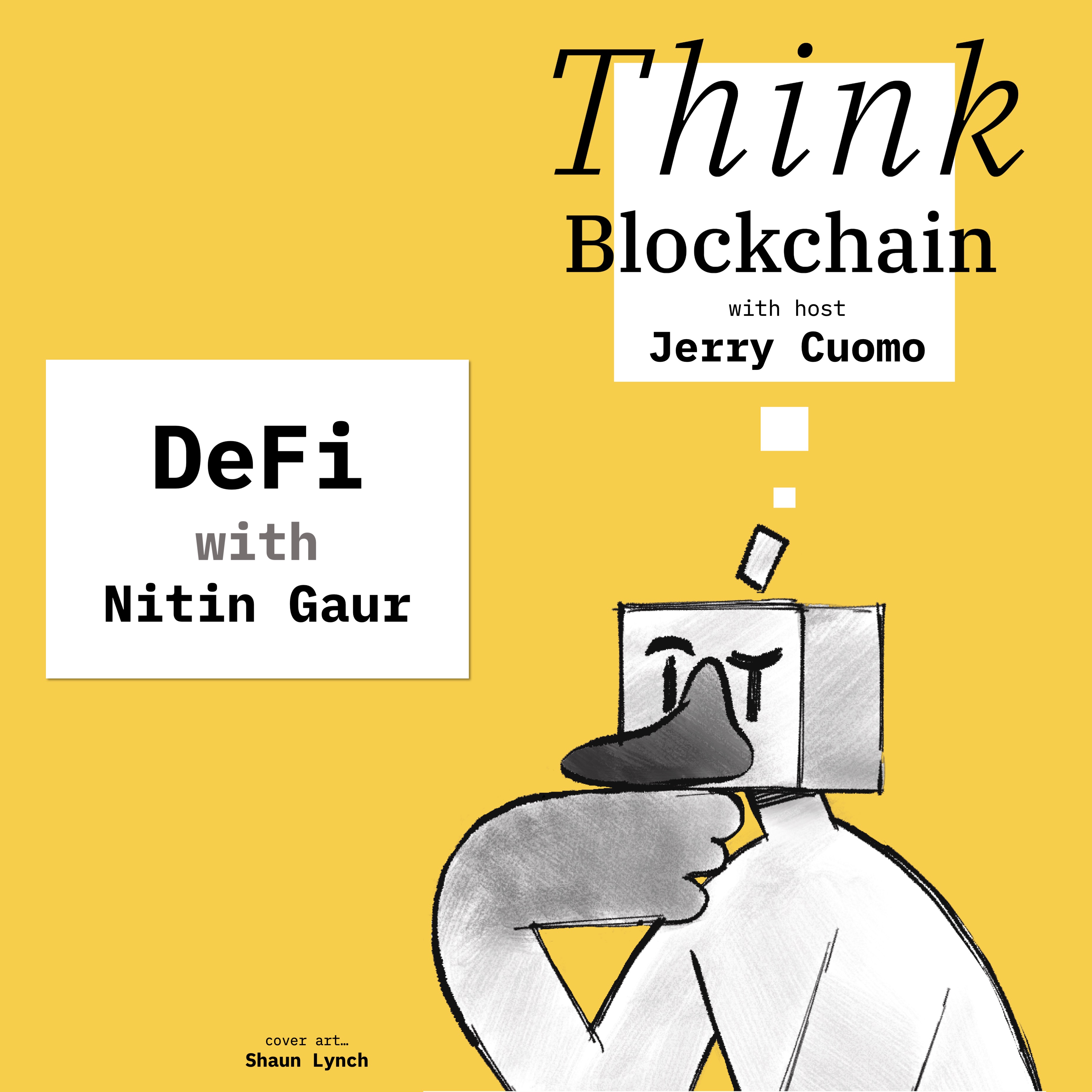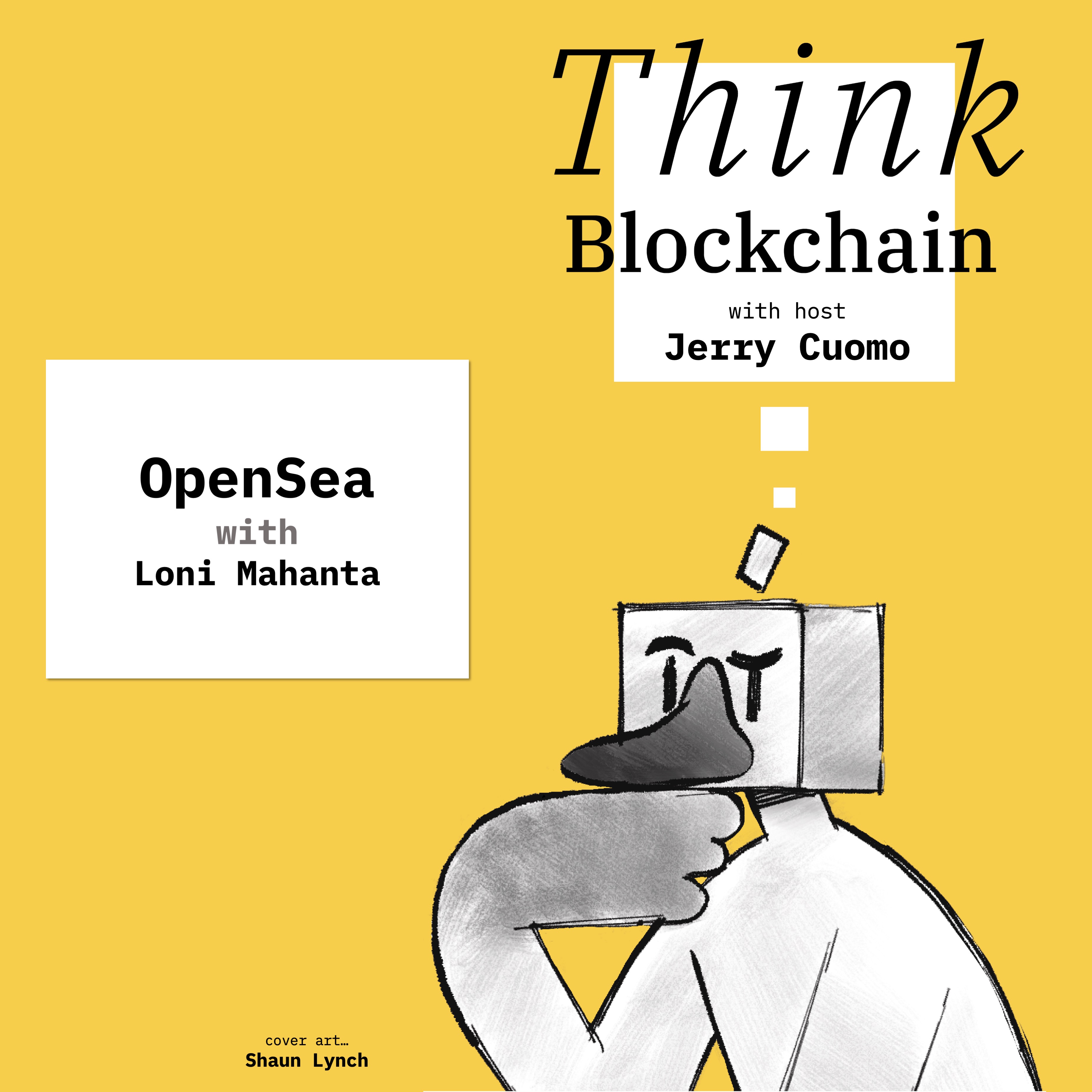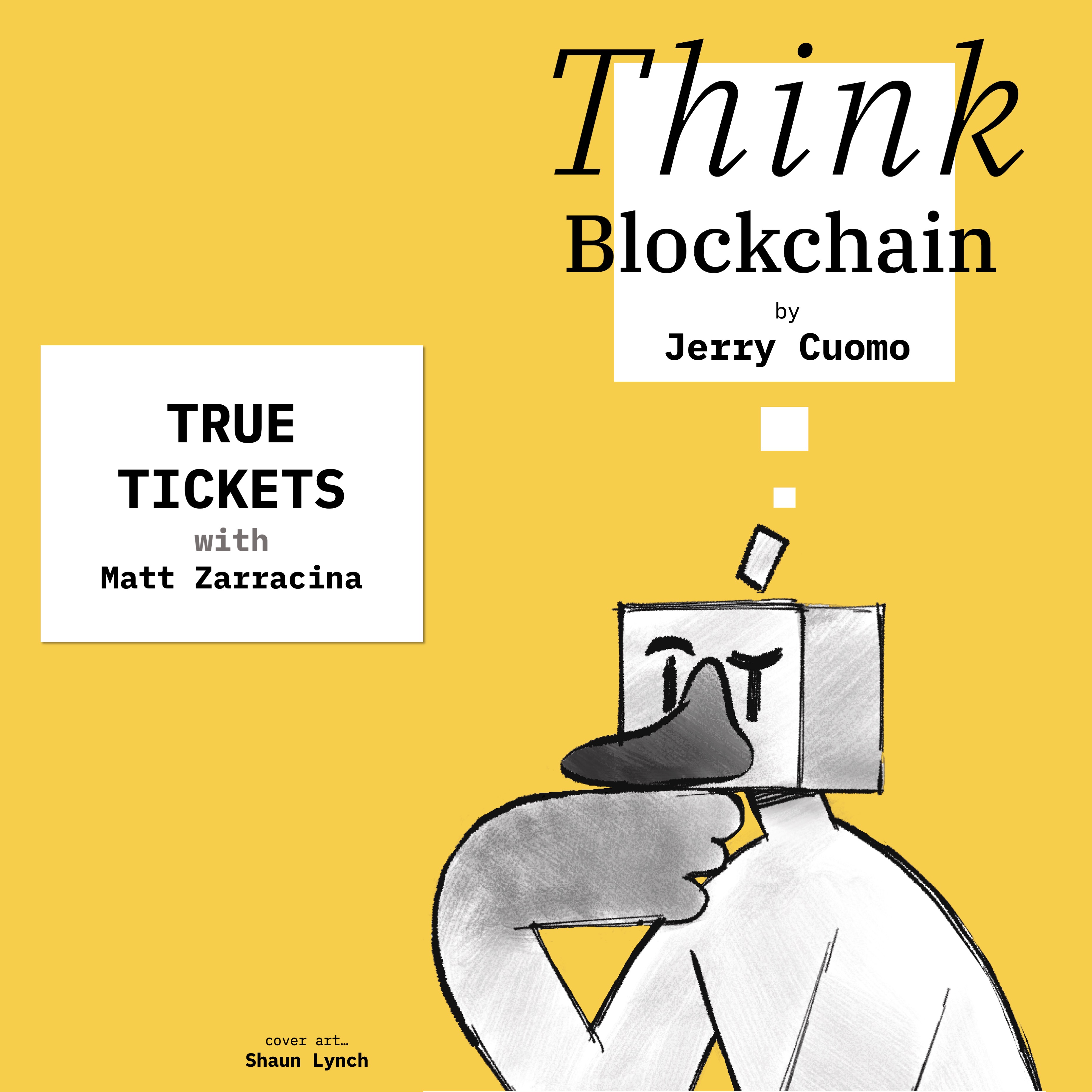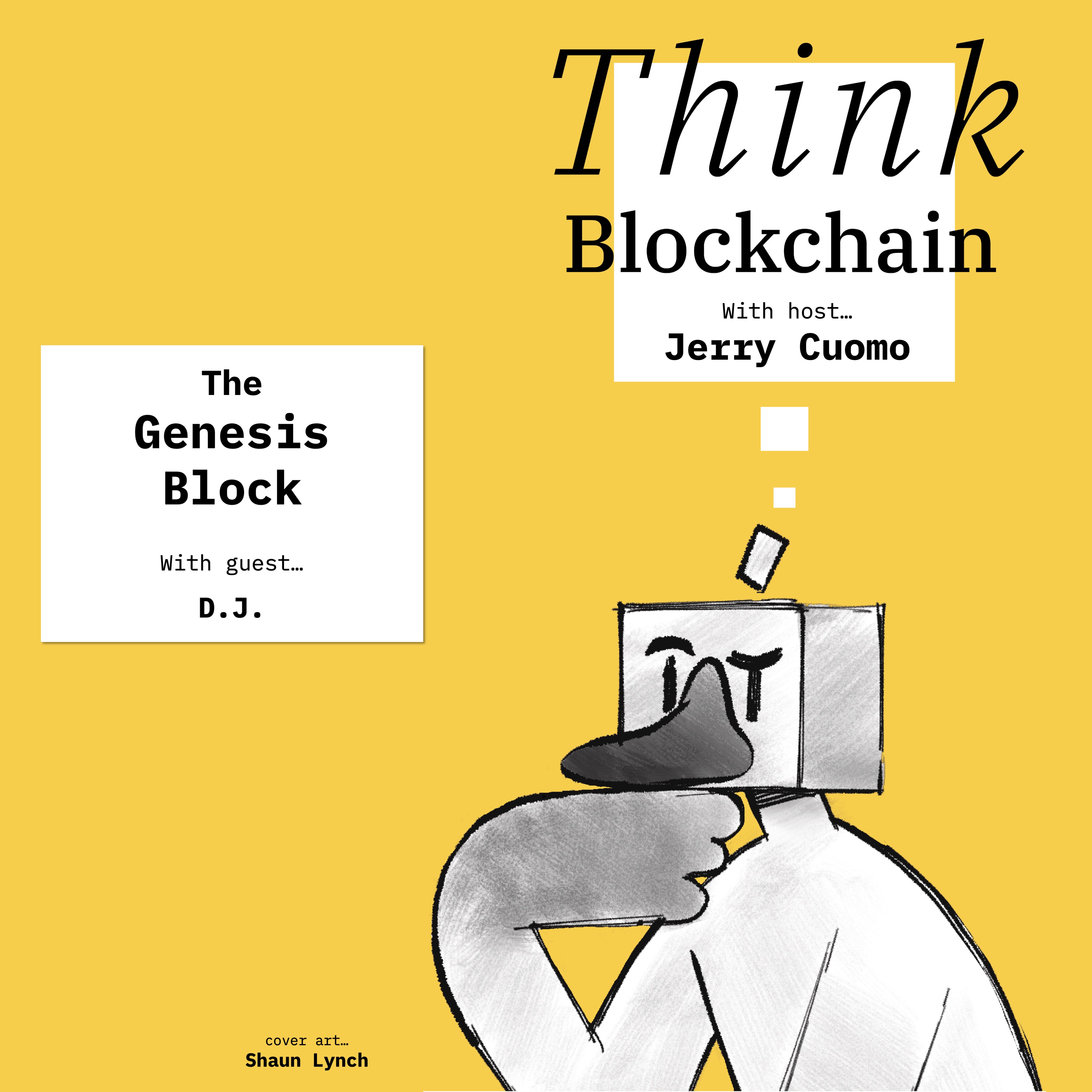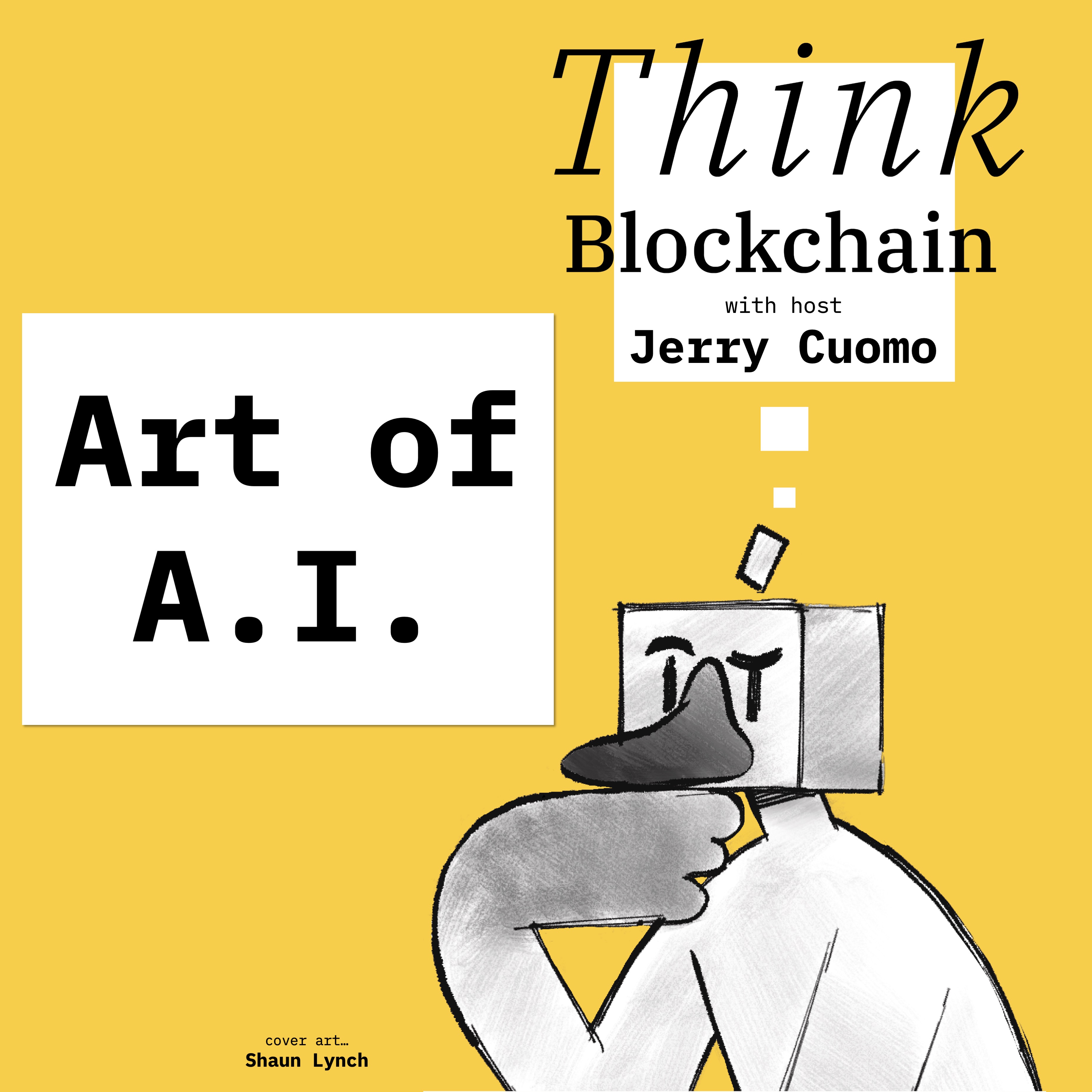Unstoppable Domains
- 0.5
- 1
- 1.25
- 1.5
- 1.75
- 2
DJ: You're listening to Think Blockchain, with your host, Jerry Cuomo.
Jerry Cuomo: Thank you, DJ. And welcome all to Think Blockchain, a podcast for those curious about blockchain's evolution to an ethical Web3 future. In 1993, I received a compact disc in the mail from America Online, and I happily installed it on my IBM PC to create what I think was my first registered account on the internet. In fact, I think I still remember my user ID and password. Well, over the past 30 years since, and considering I am an avid user of the web, a fun yet fair calculation estimating, say, one new registration per week would mean I registered with nearly 1600 websites and created that many user IDs and passwords since the beginning of internet time. And while I've abandoned and forgotten 90% of them, I sometimes am reminded that the dark web has not. And yes, I know there are such things as password managers, but in my humble opinion, that's a bandaid to a much deeper issue, which is, we are not in control of our digital identity. Personal data and privacy are amongst the biggest issues off of the internet today. Imagine if there was a way to have just one identity, say jerrycuomo. com, and that's the only place where my identity lives. And in this world, things get flipped around. Companies now come to me to validate my identity, versus me going to them. This way, when I'm done doing business with that company, I simply revoke their access rights to jerry. com. And I never need to send another unsubscribe email and pray I actually get removed. And like privacy, there's also reputation. During the past 30 years, I've worked hard and have taken pride in my online reputation, whether it's my seller rating on eBay, my Yelp and Yahoo restaurant reviews, or my social media followers. Yet, every new website or company that I register with, I start over, building my reputation from scratch. Well, folks, we don't need to imagine anymore. My next guest is a world- class inventor and innovator, and a friend. Lisa Seacat DeLuca is my guest and is leading one of the most encouraging Web3 movements around digital identity at Unstoppable Domains. Oh, and she's not a stranger to my podcast, having appeared on Art of Automation as well. So, let's get this show on the road. Welcome again, Lisa, this time to Think Blockchain.
Lisa Seacat DeLuca: Thanks for having me, Jerry. I'm so excited to be here.
Jerry Cuomo: So, Lisa, tell us why you love what you do?
Lisa Seacat DeLuca: I am a director of engineering over at Unstoppable Domains. And I love it because I'm empowered to innovate, and we are doing some cutting- edge stuff in the next generation of the internet, Web3. And it's just so exciting to be on the front lines of what is the future of the internet.
Jerry Cuomo: Wonderful. Oh, I'm excited about the space too. So let's keep going here. Tell us a little bit about what the mission is at Unstoppable Domains.
Lisa Seacat DeLuca: Sure. Our mission is really to create user- owned digital identity for every person on the planet. And what that means is NFT domains are the infrastructure that allows people to own their reputations and their data. So, think about it as giving people the power to really drive equity, privacy, and empowerment for billions of people.
Jerry Cuomo: Wow. Now that is one powerful goal. Okay, Unstoppable Domains. What exactly in this context is a domain? I mean, I've created internet domains before, like thinkblockchain. org, on domain service providers like GoDaddy. Can you share perhaps a compare and contrast?
Lisa Seacat DeLuca: Sure. At Unstoppable Domains, we have 10 different TLDs, or top- level domains, and those are just the endings. Like dot com is what you're used to in the Web2 space. So with our Web3 NFT domains, we have dot X, dot crypto, dot wallet. Pretty much those TLDs that match that crypto terminology or name space. So it's a fun way of thinking about, sharing that you are part of this new wave of technology. It's not necessarily like a traditional Web2 domain name in that it's not used necessarily for hosting websites. Yes, you can. You can point to an IPFS decentralized website, but most people use it as their digital identity. So think of an NFT as this piece or block of information that you can build on top of so you can start adding in different information about yourself and building out who you are.
Jerry Cuomo: In fact, Lisa, a few weeks ago, I went out to Unstoppable Domains and I purchased a Think Blockchain dot NFT to hopefully represent the book and the podcast, and maybe some digital assets that come from that top down.
Lisa Seacat DeLuca: I love that.
Jerry Cuomo: I'll be seeking your advice to how to put those in play. But let's keep going on the identity part. There's a connection between domain names and digital identities. Can you elaborate on that a little bit?
Lisa Seacat DeLuca: Sure. So Web3, I'll just back up a little bit. When you think about Web1, it's really read. So it's this idea that regular pieces of data is now on the internet for everyone to share. You can go and read it. Web2 is more of a write. So this is the introduction of social media websites like Facebook and Instagram, where you can start sharing your own content or commenting on the things your friends are adding. So that's the write aspect. And Web3 is really about ownership. So it's this idea that you, as an individual, can own your data, decide who you're going to share it with or who you're not going to share it with. And then, it's really about building out your reputation and ownership. So ownership is like digital scarcity. This idea, like NFTs, there's one of them. It's non- fungible. You can't change your Think Blockchain dot NFT with somebody else's. It's yours. It's the only one out there in the world. So that's what we mean by ownership is, you really do have that proof of provenance from what you get with blockchain that you wouldn't have in any other nature.
Jerry Cuomo: Is your identity equal to your wallet, or is your wallet associated with your identity? And then, what sorts of credentials do you keep with your identity? I mean, everyone knows user ID and password. What other kinds of credentials?
Lisa Seacat DeLuca: Absolutely. So we're probably all used to, when you go to a website, you go to sign in. And then there's things like OpenID that allow you to log in with your Gmail account across multiple different websites, not just the Google suite of products. Most Web3 dapps have this connect with wallet. So you come in, you see a button similar to login. You're going to hit connect, connect with wallet. And that's going to say," All right, I need to sign a message that says I am who I say I am. I don't need to use a password. I'm just signing my crypto wallet." And that allows you access into this space. So what we're doing is we're taking it a step further. So when you're logging in, you're logging in with your Unstoppable Domain. So I'm Lisa dot X. So I'm going to log in with Lisa dot X. And then with that, because it's OpenID standards, we can say," Okay, what scopes am I going to share? What are those pieces of data that I'm willing to share with this application I'm logging into, versus another one?" And so, that's where it starts to really build out that promise of Web3 and data ownership, because I get to decide what I'm sharing and what I'm not sharing.
Jerry Cuomo: So can we talk a little bit about, this is Think Blockchain, the role of blockchain in all of this? Would what you're talking about around digital identity be achievable without blockchain?
Lisa Seacat DeLuca: Blockchain is definitely the underlying technology that makes it possible. Sure, you could do bits and pieces from a centralized database or some other way of doing it. But you miss that provenance that comes with being part of the blockchain, this history, and almost a collaboration of having multiple people give their thumbs up that yes, you are who you say you are, or this data is what it says it is. With that, there's no other technology today that can do that in the way that blockchain can.
Jerry Cuomo: Is there a specific blockchain technology or blockchain network that you store your Unstoppable Domains on?
Lisa Seacat DeLuca: Yes, unstoppable is on Polygon.
Jerry Cuomo: Is there a specific reason that led you to Polygon?
Lisa Seacat DeLuca: Yeah. We started out on another EVM and decided to move over to Polygon just to lower the gas fees for our users. So we actually cover the gas fee. When you go to mint your Unstoppable Domain, we've got you covered.
Jerry Cuomo: Perfect. Now, in some of the work we've done in the past around blockchain and identity, there was a rule of thumb, and I'm curious where we stand with that, that you don't actually put personal identity information on a blockchain. You use the blockchain as a way to verify proofs, permissions, and things like that. Is that still true?
Lisa Seacat DeLuca: Yeah. And in fact, I see it as more of a hybrid future. There is some use- cases where some data is still going to live in a centralized database for persistence, and then other information that could live in the blockchain. Even medical records, right? Does it need to live in the blockchain? Eh, even if it's encrypted, what's the use- case for that? So it's really more about the transactions around it, knowing that you went to the doctor, knowing what your provider ID is. Something like that'll be on the blockchain, but not necessarily everything, because it can get expensive. We're looking at ways to make it better for the environment by using a blockchain that's more like a layer two blockchain instead of the layer one blockchain to reduce the costs for our users. And those kind of innovations from, how do you bridge between different layer one, layer two solutions, and how do you start thinking about what it means to have consensus across the blockchain is areas we'll be exploring in the future.
Jerry Cuomo: Okay. So, my healthcare records, the actual data will sit in a file system, let's say on the interplanetary file system encrypted, but on a blockchain that will be linked to maybe permissions to give my healthcare provider a license to use it maybe once, or maybe for a year, or maybe for some period of time until I revoke their privilege. Is that kind of like it?
Lisa Seacat DeLuca: You got it. Yep. It's all about, the problems with web2 are around ownership and privacy, and then reputation. So the ownership is what you're referring to when you're talking about access to data and when someone has access to data. When does that permissioning expire depending on the use- case or depending on what you need to do with it? So it's so exciting just to start playing in this space.
Jerry Cuomo: I agree. And as we're talking, it's all about everything you said. It's also about unlocking the data, because now the data could be leveraged and used in different ecosystems, not just the ecosystem in which it was created, which I think it actually gives a lot more flexibility. I think about things like loyalty points, and the fact that my Starbucks loyalty points are all locked up within the Starbucks ecosystem. I drink a lot of coffee, Lisa, and I would love to trade some of my airline miles for Starbucks points, but those are two different ecosystems. But if my loyalty tokens sat outside of either of those ecosystems, maybe in a neutral zone, that can be used more to integrate this. Am I just making this up, or does that make sense?
Lisa Seacat DeLuca: You got it. That's why web2, or web5, sometimes you'll hear it called that, as this walled- garden effect of web2, where there are these big companies that really own your data. They control when you access it. They control who they're sharing it with. We're starting to get rid of that concern that you don't, as a user, really have that full control.
Jerry Cuomo: Hey, Lisa, that's wonderful. Now I really get an appreciation for the benefits of digital identity, decentralized identity, and perhaps how Unstoppable Domains can be a provider around that. Now, can you tell us some of the things that folks should be cautious of out there? So what are the things that still need to be built out, some of the areas where you would issue caution?
Lisa Seacat DeLuca: Yeah, I think that might be one of the hesitations in adoption for Web3 applications is, people are scared. They're not sure. It seems complicated to have to have a wallet and be able to sign messages, and what if I type something in wrong? And that's one of the use- cases for our domains is, let's make it human readable, similar to how IP addresses used to be long digits and now it's google. com. That same use- case can be applied to cryptos. So you just have to be careful when you're dealing with links, especially. Don't click on something from someone you don't know or make sure it's trusted source. There's websites all over the place now that are helping people get there. There's a new company called Glypta, which is all about understanding if you can trust a new application that's coming out there and sharing your experience with other people. Because you hear all these horror stories about people losing their private keys or their wallets being drained. So I think for that reason it's scary. But at the same time you should play. Have enough crypto in a wallet to be able to buy an NFT and have that experience, and transfer some of your balance over to a cold wallet, and what does that mean? And what's it mean to have multiple wallets? There's a lot of fun exploring side of things that even with the scams still makes it exciting and worth it.
Jerry Cuomo: Lisa, can you then keep building out on that? Because what I'm hearing is something around user experience. And I just think of some of my elderly relatives who have really taken up tech, although I am their in- house tech provider, how they would manage their digital wallets. I think being able to go to MetaMask or a place like that would be a bit difficult for them. So do you see a role of intermediaries to make the user experience better around these technologies? Or is this something that maybe in time will just get better?
Lisa Seacat DeLuca: Yeah, I think it's an in time, it'll get better. I also think there are some innovations and some new companies that are spinning up that are trying to hide that wallet side of things so you don't have to have the signatures. We're working on a backup and recovery solution as well, so if you were to lose your private keys, you could transfer to yourself if you had another backup wallet. So there's definitely use- cases where people are starting to explore that space, but the benefits outweigh all the negatives, I think. Imagine a new social network or a new platform that comes up like TikTok. I'm not a TikTok user, but it's new and exciting. People are going over there and it's," Well, why do I have to start fresh when a new company comes up? Why can't I bring my followers, and everyone I know, and my reputation with me? I should own that. It shouldn't be part of that other company or the new experience." So those use- cases are so exciting.
Jerry Cuomo: Okay, it's predict the future time. Lisa, can you look into your crystal ball and tell us what you see?
Lisa Seacat DeLuca: I predict that we're going to have some really cool unique experiences for users. We talk about machine learning, and AI, and the benefits of machines just learning about individuals over time. This is a mass- scale AI where you get to tell the applications you're going to a little bit about yourself so they don't have to do all the learning there. But then add on top of that the AI, now what? It's going to be so smart, and our experiences in general with the web are going to feel like we are heard and seen as individuals. And our experiences are going to be unique because of it.
Jerry Cuomo: So it's great that we'll be getting back our identities and working on user experience to make it easy to maintain our wallets, or maybe not even have to worry about wallets. And I love what you said about bringing AI. I think both from a user perspective, but also from a consumer perspective, I think there can be a lot of benefits around that.
Lisa Seacat DeLuca: Yeah. And bringing yourself between different applications. We're seeing in the gaming use- case for web3 games where you can bring your username from Snook over to Evolution Land or Descend Tribes. All of that from just logging in with your Unstoppable Domain. And same with DEFY, right? Having that same ID across all these applications is a little thing, but it's so powerful because you know you are you and nobody else can be you.
Jerry Cuomo: Well, we've just about run out of time. Lisa, it's always great talking to you. It's so encouraging to hear how you and your colleagues at UD are taking a run at reimagining digital identity for our Web3 future. Thanks for joining.
Lisa Seacat DeLuca: Thanks for having me. This was fun.
Jerry Cuomo: It certainly was. Thanks again, Lisa. Well, that's it. It's time to commit this episode to our blockchain. Oh, and if you'd like to view more information about this compelling use- case, I've included a number of links of additional reference materials featuring Lisa on this very topic. One last thought. If a tree, or should I say a podcast, falls in the woods, does it make a noise? Well, Think Blockchain has a few sponsors who will be helping us make some noise by providing support for marketing the Think Blockchain podcast in book. Since royalties from the book are being donated to the American Cancer Society, we want to get the word out and make some noise. So, this episode is brought to you by IBM. IBM continues to be a thought leader and world class implementer of world- scale blockchain solutions. Blockchain for business is IBM's thing. And Think Blockchain book is filled with examples like Food Trust, TradeLens, and the New York Excelsior vaccine pass, all built by IBM. IBM puts the think in Think Blockchain. I'm also proud to announce that this podcast is also brought to you by Kaleido, blockchain made radically simple for the enterprise. Visit Kaleido. io today, where you can take a free ride on the blockchain business cloud. Here you can stand up an enterprise blockchain in minutes on AWS, Azure, or on your own private cloud. Kaleido's blockchain as a service combines the dramatic simplicity of software as a service with performance, security, and global reach. Now, if you're a developer, you know building Web3 apps is not a walk in the park. All I'm going to say is, Kaleido recently introduced Hyperledger FireFly in a Supernode for enterprise Web3. I hope I piqued your interest here. And if I have, you can find links to IBM and Kaleido in the description section of this podcast, where you can also find a link to buy a bunch of copies of Think Blockchain. And remember, buying is donating to fight cancer. Well, that's it for today. Thanks for joining. This is Jerry Cuomo, IBM fellow and VP for Technology at IBM. See you soon on an upcoming episode.
DESCRIPTION
On the trending topic of Web3 digital identity, Jerry is joined by the ever amazing Lisa Seacat Deluca, leader of Web3 identity at Unstoppable Domains, WITI Hall of Fame, 3x LinkedInTopVoices, inventor, speaker, and author of 2 children’s books!
“The internet is an unstoppable force, and for 50 years its drummed the rhythm of humanity's march forward. But somewhere along the way, we missed a few beats. Surrendered our data and privacy. And became ‘users’ instead of people.”
This is part of the Unstoppable domain’s mantra, in which Lisa and Jerry deep dive into, describing how a new style of “easy to read” domain names (e.g., LisaSeacat.x) is the ticket to becoming people again and defining the future of Login and Identity for Web3.
This podcast is sponsored by IBM Blockchain and Kaleido. Comments by Jerry, DJ, and Guests are their own and don't necessarily represent the sponsors position or opinions.
Today's Host

Jerry Cuomo
Today's Guests

